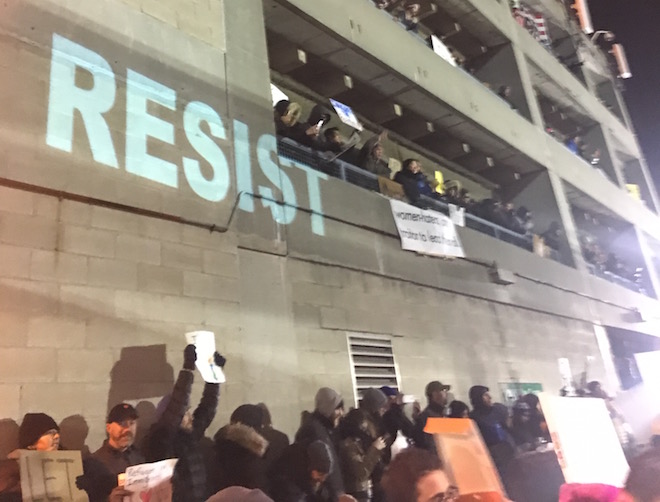Between President Donald Trump’s proposed wall along the border with Mexico, his threat of a trade war with China, rejection of the Trans-Pacific Partnership and skepticism about funding NATO, there’s no question that he seeks to separate the U.S. from the rest of the world. Virulent racism and explicitly anti-immigrant rhetoric are beginning to metastasize into actual, though disjointed and poorly executed policy. Yet a robust resistance movement is rising to meet it, and airports — perhaps the perfect symbolism of benevolent globalism — have become a locus of that resistance.
When Trump issued a draconian executive order banning refugees and Muslims from seven nations from entering the U.S., protests spontaneously came together at airports around the country. This was the beginning of true mass resistance to the Trump administration (the Women’s March, although clearly in opposition to Trumpism, had been organized long before he entered the Oval Office). The airport protests were in direct response to an action he had taken; they were carried out by diverse groups of activists as well as grass roots supporters; and they were sustained until they brought about a positive result in a legal injunction issued by a Brooklyn judge. Most importantly, by choosing airports, especially John F. Kenney International Airport in Queens, New York, as the focal points of the protests, the fundamental dispute between the Trumpists and the resistance was crystalized.
A fundamental tenant of Trumpism has been a toxic “America First” isolationism. From wanting to build a wall along the border with Mexico to banning refugees and Muslims from entering the country to threatening to implement massive tariffs on imported goods and cut off funding for NATO, Trump has made it clear that he sees America as an island unto itself, removed from the rest of the world. He wants to slam the door shut on immigrants and foreign trade. He has gone so far as to threaten to invade Mexico. Globalism is anathema to him.
So an airport is an ideal symbol for those who oppose Trump. And JFK, as the epicenter of this fight, is the perfect symbol. JFK, originally known as Idlewild, was created in 1941 as a Navy airfield in the days immediately following Pearl Harbor, and its first role was as part of the American bulwark against fascism. It was renamed John F. Kennedy International Airport on December 24, 1963 in the wake of President Kennedy’s assassination. New York Mayor Robert F. Wagner first made the case for renaming the airport on December 2: “John F. Kennedy will live on in each of us, and in the policies and practices of the country he knew and loved and served so well. And now, in the words of poets, we say: Good night, sweet prince. May flights of angels sing thee to thy rest. He rests. His labor’s done, ours is but begun.”
And when the airport was officially renamed, Wagner spoke again: “This civilian airport is a symbol of inter-communication, understanding, and peace. The name is already assured of remembrance[…]We do not pretend to add to the name’s luster by adopting it for eve this great crossroads of the world’s skyways.”
JFK airport, built for the Navy then ceded to the people — a civilian airport — was named for one of the great heroes of American democracy and dedicated in a spirit of global peace and connectedness. In 2016 almost 59 million people passed through JFK’s halls, from far flung states and nations around the world. It is the port of entry for the polyglot immigrants and refugees that comprise New York City. It is in Queens, the most diverse bit of land in the world, where 136 languages are spoken. And it’s in New York, a city built by immigrant labor and the webs of finance and media and circle the globe. It is the physical antithesis of everything Trump espouses. (And the city has marched against him and voted against him, and it has rejected him at every turn.)
Now, as the flashpoint for opposition to the Trump administration, JFK once more is a symbol of global peace and freedom and inter-communication. One chant, often repeated by the more than 5,000 protesters gathered Saturday night was “Hey, hey, JFK, no more fascist USA!” Going forward, in the inevitable battles yet to come, it’s easy to imagine that protesters might raise a chant to remember JFK.


